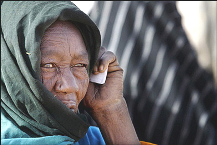Darfur peace talks in doubt amid humanitarian crisis
By Abraham Fisseha
ADDIS ABABA, July 18 (AFP) — Rebels from Darfur left Addis Ababa on Sunday, dealing a blow to international efforts to launch peace talks with Khartoum as aid groups warned of a worsening crisis in the region of western Sudan, where at least a million people have fled their villages.
 The Justice and Equality Movement (JEM) and Sudan Liberation Movement/Army (SLM/A) left the Ethiopian capital after refusing to enter into direct negotiations until the Sudanese government agreed to their demands about demilitarising Darfur and bringing war criminals to book.
The Justice and Equality Movement (JEM) and Sudan Liberation Movement/Army (SLM/A) left the Ethiopian capital after refusing to enter into direct negotiations until the Sudanese government agreed to their demands about demilitarising Darfur and bringing war criminals to book.
“We are going back home because on our part, we have given the message of the Darfur people. We did not walk out. We have consulted with mediators until the last minute,” JEM coordinator Ahmed Tagod Lissan told AFP, also speaking on behalf of SLM.
Despite efforts by the African Union (AU) and the UN, the two sides only sat down together once during this latest initiative, on Thursday, when the encounter degenerated into a prolonged shouting match.
In a statement, the AU, which gave no date for future talks, said mediators had “strongly underlined… (that) implementation of the agreements previously reached (such as a shaky humanitarian ceasefire signed in April) was crucial to creating a conducive atmosphere for the progress in political talks.”
More than 10,000 people have been killed in Darfur since the rebels rose up in February 2003, prompting a heavy-handed response from Khartoum and allied militia forces.
Top UN officials have described the humanitarian crisis there as the world’s worst.
On Friday, aid groups warned that onset of rains had severely hampered efforts to help hundreds of thousands of displaced people there, and across the border in Chad.
The World Health Organisation has also warned that a major health catastrophe could erupt in Darfur if the necessary funds and supplies were not made available to fight disease and malnutrition.
The UN’s refugee agency, UNHCR, warned of a “serious crisis”, after surveys by a medical team found acute malnutrition levels in refugee camps, up to 38 percent in the case of children.
Local Chadians, who are also suffering “high levels” of malnutrition, are sharing food with the refugees, according to UNHCR.
The rebels, whose chief preconditions were that Khartoum withdraw its regular troops from Darfur and disarm militia forces blamed for causing widespread devastation and committing atrocities in the region, said the failed talks offered “a chance for the world to see how the Sudanese government is not committed to avert the crisis in Darfur.”
The rebels also suggested Nigeria, Libya and Switzerland as possible venues for future talks, saying Ethiopia, which hosts the AU headquarters, was too close politically to Khartoum.
Government officials in the Ethiopian capital insisted they were determined to solve the Darfur problem, and urged the rebels to turn their preconditions into agenda items for future talks,
The rebellion in Darfur sprang up in February 2003 to press home demands for an equitable share of national development.
Sudan, Africa’s largest nation geographically, is in the last lap of peace talks with another southern rebel group, Sudan People’s Liberation Movement/Army (SPLM/A), which took up arms in 1983.
